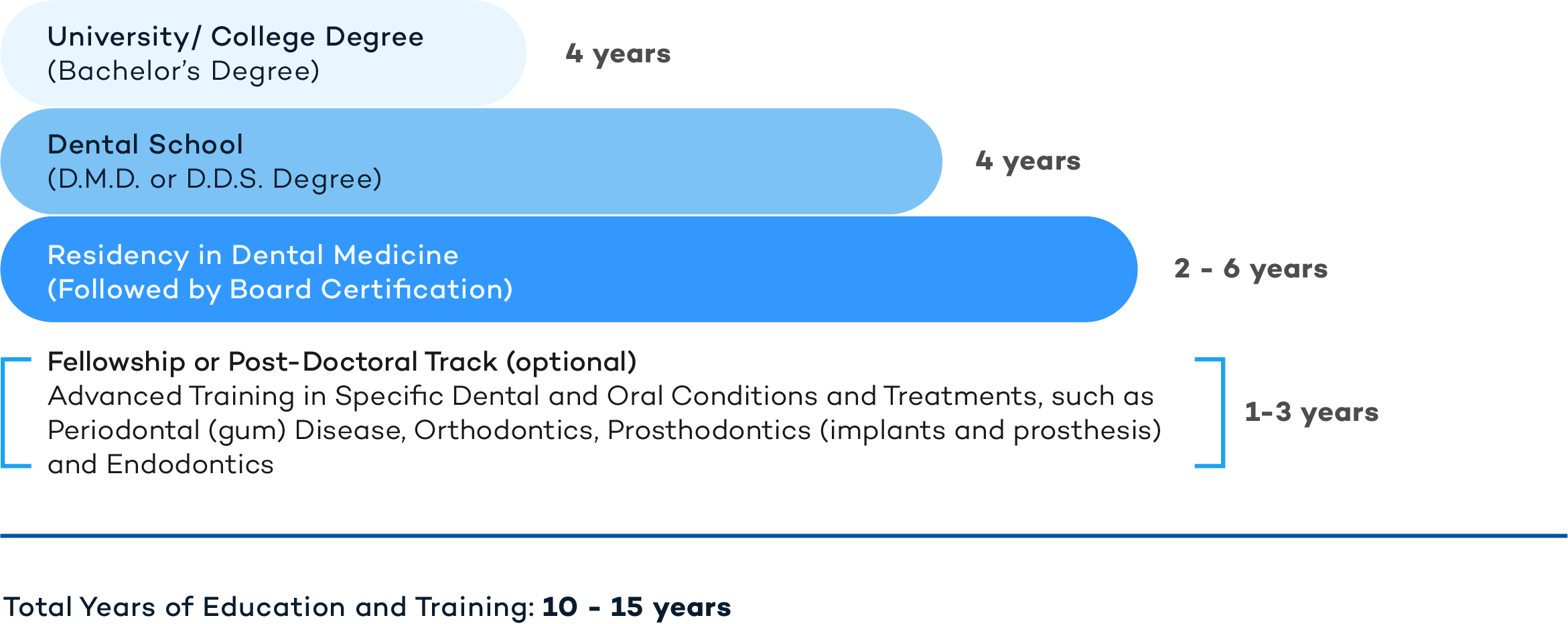

A Dentist, also known as Odontologist, is a Board-Certified doctor who provides preventive and restorative care for all oral health needs. Dentists treat all health issues related to the teeth, as well as of the entire mouth and oral cavity. This includes the oral mucosa, the gums, and even the bones, such as pain and conditions of the Temporo-Mandibular Joint, also known as TMJ. Dentists do extensive research, and perform innovative restorative and preventive procedures to enhance dental and oral health. Dentists are able to do surgical and non-surgical preventive and restorative procedures of the teeth and oral cavity.
When searching for a Dentist, you may review and check his/her credentials, observe a Picture Gallery with the Before and After results, and learn about his/her practice style with the help of your family and friends. myDoqter can help you do this by giving you access to other patients’ feedback about doctors, and you can also see the professional recommendations given by other physicians who have witnessed first-hand the expertise and professional competency of your doctor.
Dentists are doctors with advanced medical degrees and training. Their titles may be either D.M.D. (Doctor of Medicine in Dentistry) or D.D.S. (Doctor of Dental Surgery). Both titles are equivalent, and indicate that the doctor graduated from an accredited dental medicine school. Dentists go through many years of extensive education and training, which includes both clinical dentistry as well as formal surgical training.
The following is representative of the years of education and training that your dentist has undergone.

DENT from the Latin root ‘Dens’ which means ‘Tooth’ + ISTRY which means ‘the study and knowledge of’. This specialty is also known as Odontology and, therefore, Dentists many times are called Odontologists: ODONTO from the Greek word ‘Odous’ which means ‘Teeth’ + LOGY from the Greek word ‘logia’ which means ‘logic’ or ‘the study of’.
Dentists treat all conditions of the oral cavity, including:
Tooth Decay and Cavities (Caries): Damage in the enamel or tooth surface, leading to cavities and plaque buildup, which can be associated with dental pain, abscess, infection, and even tooth loss if untreated.
Cracked or Broken Teeth: This may result from an accident or as a result of eating habits, and your dentist can help you with various tooth repair approaches.
Misaligned Teeth and Crooked Bite: Any of these processes can be corrected using Orthodontics, which many dentists perform.
Tooth Staining and Yellowing: Your dentist can discuss ways to effectively reduce the staining or dark color of your teeth. Many dentists also offer various teeth bleaching (whitening) treatments.
Sensitive Teeth: Dentists can help you with this problem, and can recommend a toothpaste that helps you with your tooth sensitivity.
Infections of the Oral Cavity: Dentists can diagnose and treat infections of the oral cavity, including: herpes, warts, candidiasis (yeast) and bacterial infections.
Gum Disease: Infection and inflammation of the gums and bone that surround and support the teeth, also known as Periodontal disease.
Oral Cancer: Cancer in any part of the mouth or throat. Some associated symptoms include: a sore that doesn't heal, a lump, or a white or red patch on the inside of the mouth.
Prevention of tooth decay and gum disease is extremely important, and it helps maintain the health of your entire oral cavity. In fact, the American Dental Association (ADA) recommends preventive dental visits every six months. Regular dental visits can mean a significant reduction in long term tooth decay and also a reduction of gum disease. Gum disease, in particular, has been linked to increased risk of heart disease.
During your visit, your dentist can discuss valuable recommendations for preventive care, such as:
For more information on Dentistry and Preventive Oral Care, you can visit the following sites:
https://www.adea.org/GoDental/Health_Professions_Advisors/What_dentists_do.aspx
https://www.ada.org/en/about-the-ada/dentists-doctors-of-oral-health
https://www.cdc.gov/oralhealth/conditions/index.html